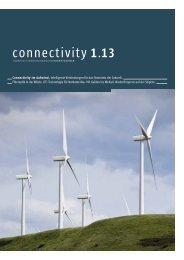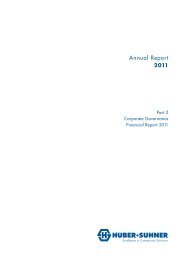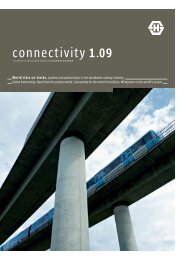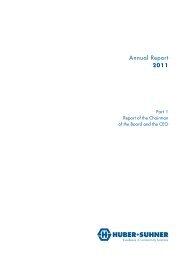Annual Report
Annual Report
Annual Report
You also want an ePaper? Increase the reach of your titles
YUMPU automatically turns print PDFs into web optimized ePapers that Google loves.
Standing committees, composition and procedure<br />
The Audit and the Nomination and Compensation Committees’<br />
areas of responsibility and authority are defined in<br />
the appendix to the HUBER+SUHNER Bylaws. The committees<br />
support the Board of Directors in its supervisory<br />
and control capacities and function mainly as consulting,<br />
assessing and preparation bodies. Each year the Board of<br />
Directors elects the chairmen and members of the two<br />
standing committees.<br />
Audit Committee Nomination and<br />
Compensation<br />
Committee<br />
Dr David W. Syz, President of BoD chairman<br />
Erich Walser, Vice president BoD chairman member<br />
Dr Peter Altorfer, member BoD member<br />
The committees meet as business dictates, but no less than<br />
twice annually. Minutes are taken at every meeting and<br />
sent to meeting participants and all Board members. Committee<br />
chairmen brief the following Board meetings and<br />
put any motions to the entire Board.<br />
Audit Committee<br />
This committee consists of at least two members. It supports<br />
the Board of Directors in supervising accounting,<br />
financial reporting, internal audit and cooperation with<br />
the external auditors. It takes decisions on urgent financial<br />
matters, subject to the approval of the entire Board. Areas<br />
of authority and responsibility allocated to the Board of<br />
Directors by law and by the Bylaws (see paragraph 9, Information<br />
Policy) remain wholly within the Board.<br />
The CFO and CEO, the Head Corporate Controlling and<br />
the external auditors attend committee meetings. The committee<br />
deals with certain agenda items with the external<br />
auditors alone as required. The committee held two halfdaily<br />
meetings in the year under review.<br />
Main tasks of the Audit Committee:<br />
– reviewing accounting functions and observance of regulations<br />
and standards;<br />
– checking annual and interim accounts and other financial<br />
information to be published;<br />
– monitoring risk management and internal control;<br />
– verifying controlling;<br />
– monitoring compliance, particularly regarding SIX<br />
Swiss Exchange;<br />
– monitoring cooperation with independent auditors and<br />
dealing with the independent auditors’ report;<br />
– determining internal audit procedure and dealing with<br />
internal audit reports;<br />
– briefing the Board of Directors on all Audit Committee-related<br />
matters not in the immediate purview of the<br />
Board of Directors.<br />
Corporate Governance<br />
HUBER+SUHNER <strong>Annual</strong> <strong>Report</strong> 2010 · Part 2<br />
Nomination and Compensation Committee<br />
Consisting of the Chairman and Deputy Chairman of the<br />
Board of Directors, the committee does preparatory work<br />
regarding nominations and compensation of members of<br />
the Board of Directors and the Executive Group Management.<br />
The committee determines – subject to the approval<br />
of the Board of Directors – annual wage increases and<br />
deals with matters that need to be handled before the next<br />
Board meeting takes place.<br />
Unless their own performance or remuneration are on the<br />
agenda, the CEO and the CHRO (Head of Human Resources)<br />
take part in committee meetings. The committee<br />
held two half-daily meetings in the year under review.<br />
The main duties of the Nomination and Compensation<br />
Committee are<br />
– managing the selection process and putting forward<br />
motions concerning new Board members;<br />
– examining the selection process and main employment<br />
conditions of the CEO and members of Executive<br />
Group Management;<br />
– remuneration recommendations for Board members<br />
and Board committee members;<br />
– examining and recommending remuneration of the CEO<br />
and members of the Executive Group Management;<br />
– examining and recommending annual salary adjustments<br />
(except for Executive Group Management<br />
members);<br />
– examining and submitting the annual wage policy<br />
proposal;<br />
– briefing the Board of Directors on all Nomination and<br />
Compensation Committee matters not within the purview<br />
of the entire Board.<br />
3.5 Definition of areas of responsibility<br />
The areas of authority and responsibility of the various bodies<br />
are set out in the Bylaws (available under http://www.<br />
hubersuhner.com/ie60/hs-u-invest/hs-u-invest-or.htm)<br />
The Board of Directors is responsible for the direction,<br />
supervision and control of Executive Management of the<br />
Group and company. The Board of Directors decides<br />
on all matters other than those reserved or passed on,<br />
by law, the Articles of Association or the Bylaws, to the<br />
General Meeting or other corporate bodies. In particular,<br />
the Board approves the business strategy and organisation<br />
as proposed by Executive Group Management, as well as<br />
budgets, medium-term plans and any other business which,<br />
by its nature or financial import, is considered strategically<br />
significant. For any projects requiring a board decision<br />
written proposals are prepared.<br />
Pursuant to the Articles of Association and the Bylaws, the<br />
Board of Directors has delegated corporate management<br />
responsibility to the CEO.<br />
The Board of Directors periodically examines and amends<br />
the Bylaws.<br />
5
















